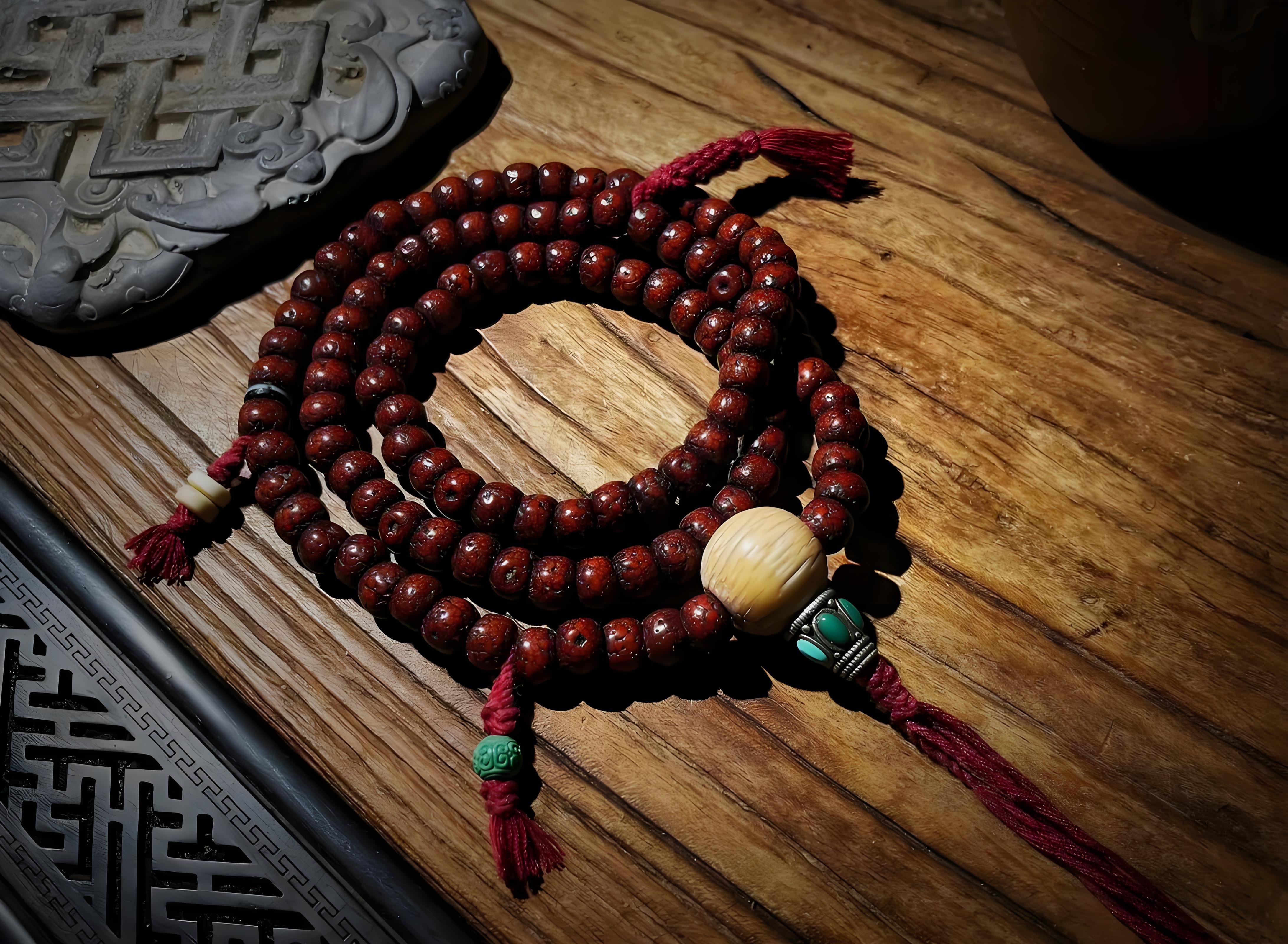Many spiritual traditions use mala beads as a tool for meditation and prayer. But have you ever wondered about the significance 108 mala beads? The number 108 has deep roots in various cultures. It is considered a sacred number in Hinduism, Buddhism, and yoga. These traditions often use it to represent spiritual completion.
The Spiritual Meaning of 108 Beads
The 108 beads mala meaning is multifaceted. For example, in Buddhism, it’s believed that there are 108 earthly desires. Therefore, using a mala with 108 beads can help one overcome these desires. Moreover, the number is often linked to the 108 sacred sites in India. Additionally, 108 is thought to represent the universe, with 1 representing the supreme reality, 0 representing emptiness, and 8 representing infinity.
Why 108 Mala Beads are Important
So, why 108 mala beads? This number is considered auspicious for many reasons. The number represents the interconnectedness of everything. When you use a mala with 108 beads, you can experience a deeper meditative state. The rhythmic counting of the beads can bring focus to your mind, thereby facilitating spiritual growth. Moreover, it can be helpful in promoting relaxation.
The Profound Meaning of 108 Mala Beads
The use of a mala with 108 mala beads meaning extends beyond mere counting. It is a symbol of your dedication to spiritual practice. Also, each bead represents a step on your spiritual journey. This journey involves self-discovery and transformation. The 108 beads offer a tangible way to track your mantras or prayers, thus enhancing your focus.
Key Takeaways on the Significance of 108 Mala Beads
Ultimately, the meaning behind 108 mala beads is a personal one. However, understanding the symbolism and history can add depth to your practice. So, whether you are new to using mala beads or a seasoned practitioner, this knowledge can enrich your experience. It can connect you to an ancient tradition. Embracing the 108 mala beads meaning can be a wonderful step on your path to mindfulness.
The Essence of a Meaningful Life
Compassion is a powerful tool in life, and we should use it as our best weapon. Also, studying Buddhism is essentially about learning how to be a better person. When faced with slander, silence often serves as the most effective response. Be thankful for those who highlight your flaws, as they offer chances for growth. True wisdom lies not just in talking, but in acting.
Accept your fate with grace, acknowledging that you are human. Remember that every wound contributes to your personal development. Respecting others is, in fact, a way of respecting yourself. Moreover, it’s challenging to grow when everything is easy, so embrace difficulties.
Cultivation involves correcting your misconceptions. Be grateful to those who bring you adversity, for they are teachers. Furthermore, those who are thoughtful of others will never be alone. Only by facing reality head-on can you transcend its limitations. The key to getting along with people is to have infinite patience. In our world, strive for smoothness, and not perfection.
Cultivating Inner Strength and Awareness
Today’s attachments lead to tomorrow’s regrets. Those who are arrogant can potentially improve; however, those who are self-deprecating cannot. Take care of yourself, rather than trying to manage others. Hating others harms you the most. Asceticism is about eliminating all forms of discrimination from your heart. Those who twist good intentions are beyond help. Buddhas help those who help themselves.
Having a selfless heart of love gives you everything. The truth of life often lies in simplicity. People suffer because they pursue the wrong things. This world is full of pain, without exception. Furthermore, those who love beauty are just in love with themselves. Connecting with others should not involve harming anyone. When you let go, worry disappears. Realizing your greatness is realizing your ignorance.
The Path to Wisdom and Peace
Cultivation requires patience, contentment, and the ability to enjoy solitude. Doctors struggle with those dying, and Buddhas struggle with those not destined to be saved. Not forgiving others is actually making things harder for yourself. As time moves forward, let it carry away your worries. Practicing for praise is like trampling on beauty. When you see others as always right, and yourself as always wrong, you will worry less. Moreover, not being so sure of your own views prevents regrets. Lowering yourself shows true nobility.
Those who think they possess wealth are possessed by it. Those who create opportunities are courageous. Those who wait for them are foolish. Do not waste your life on things you will regret. Studying Buddhism is about being accountable to your own conscience, not for show. Caring and blessing others silently is a form of giving.
The Importance of Self-Reflection
Only by knowing, subduing, and changing yourself can you change others. Love without attachment. Separation is inevitable. It’s better to say your cultivation is lacking, rather than that others cause you pain. Why tell one lie, and then ten more to cover it up? Forgiving others makes room for maneuvering. A wasted day is like stealing. Let go of emotional attachments to find freedom.
Coming is accidental, and going is inevitable, so adapt while remaining true to yourself. Adapting is not about being complacent. It’s about doing your best and accepting your fate. Using harmful means to hide your shortcomings is shameful. People are responsible to the law, but those who cultivate are responsible to karma. If you make simple things serious, you will be unhappy. Never waste a second thinking about those you dislike.
Living with Authenticity and Awareness
When you are honest with yourself, no one can deceive you. Listen more, and speak less. Don’t feel unlucky; many suffer more. Use humor to improve your life. The more you focus on others, the less you focus on yourself. Do not mix arrogance with wisdom, or humility with a lack of it. Those full of their own ideas will never hear others. Accept facts rather than rejecting them. If you can’t forgive others, you’ll never be at peace.
Destroying someone takes a sentence, while building them up takes much more. Be mindful of your words. Do not always look so intently. After many years, what will be yours? When you know you are confused, it’s okay. However, not knowing is concerning. Hatred cannot resolve hatred; only compassion can. Ignorant people want to be understood. Wise people strive to understand themselves.
Cultivating Inner Peace and Growth
Repent if you see the faults of others. Adversity is necessary for growth. Don’t pity others; focus on your own cultivation. Troubles are false, so why worry? Those who are jealous, dishonest, and not upright cannot be considered beautiful. When advising others, consider their feelings. Many regret their life when dying. Before studying Buddhism, everything is displeasing. After, everything is pleasing. Use compassion to express your feelings. Don’t be dissatisfied with others; focus on yourself.
Why poison the same bottle, or fill your mind with worries? When happy, remember it will end. When suffering, remember it will end. Jealousy helps no one. To understand a person, see if their beginning and destination match. If you don’t trouble yourself, others cannot. It’s your own heart that prevents letting go.
Accepting Reality and Finding Contentment
Do not try to guess the thoughts of others. Accept fate, it is better than complaining. Don’t worry because of the ignorance of others. Perfume won’t mask a lack of cleanliness. Virtue creates fragrance. If you could see your own faults as clearly as you see others, you would be extraordinary. What you possess will one day belong to another. Therefore, give to those who need it now. When poor, give your time and labor.
Being alive for a day is a blessing. When you cried because you had no shoes, someone had no feet. Those with less luck hear gossip. Those with more luck do not. Cultivation is a gradual effort. Always forgive others, no matter how bad they are. Let go to find true happiness. Those with karmic obstacles focus on the faults of others. True cultivators don’t. All evil is false, so don’t be self-deprecating. All good is false, so don’t be arrogant.
The Path to Enlightenment and Compassion
No need to look back at those who curse you. Don’t bite a mad dog back. The first concept in Buddhism is to not look at the faults of others. This will pollute you, preventing growth. Do not be upset at criticism, or elated by praise. There is good in the bad, and bad in the good, so know how to use it. Face everything with a smile. Be at ease and follow your heart. What is destined to change your life is only the time of one flower blossoming a hundred years later.
Those who praise are not true teachers. Those who point out our faults are. We improve with them. If you want to know about the world’s calamities, listen to the sounds from a butcher. Don’t complain; consider how many beings have died because of you. Everyone has life, but not all understand or cherish it. Love is not a charity. Feelings have no logic; people pursue them to death. People are not bad; they have habits. Forgive them and don’t see them as bad. Tolerate those with different opinions. Don’t try to change them. Learn to endure them. Things we cannot have seem wonderful because we know little about them. When you truly understand them, they are not as special.


